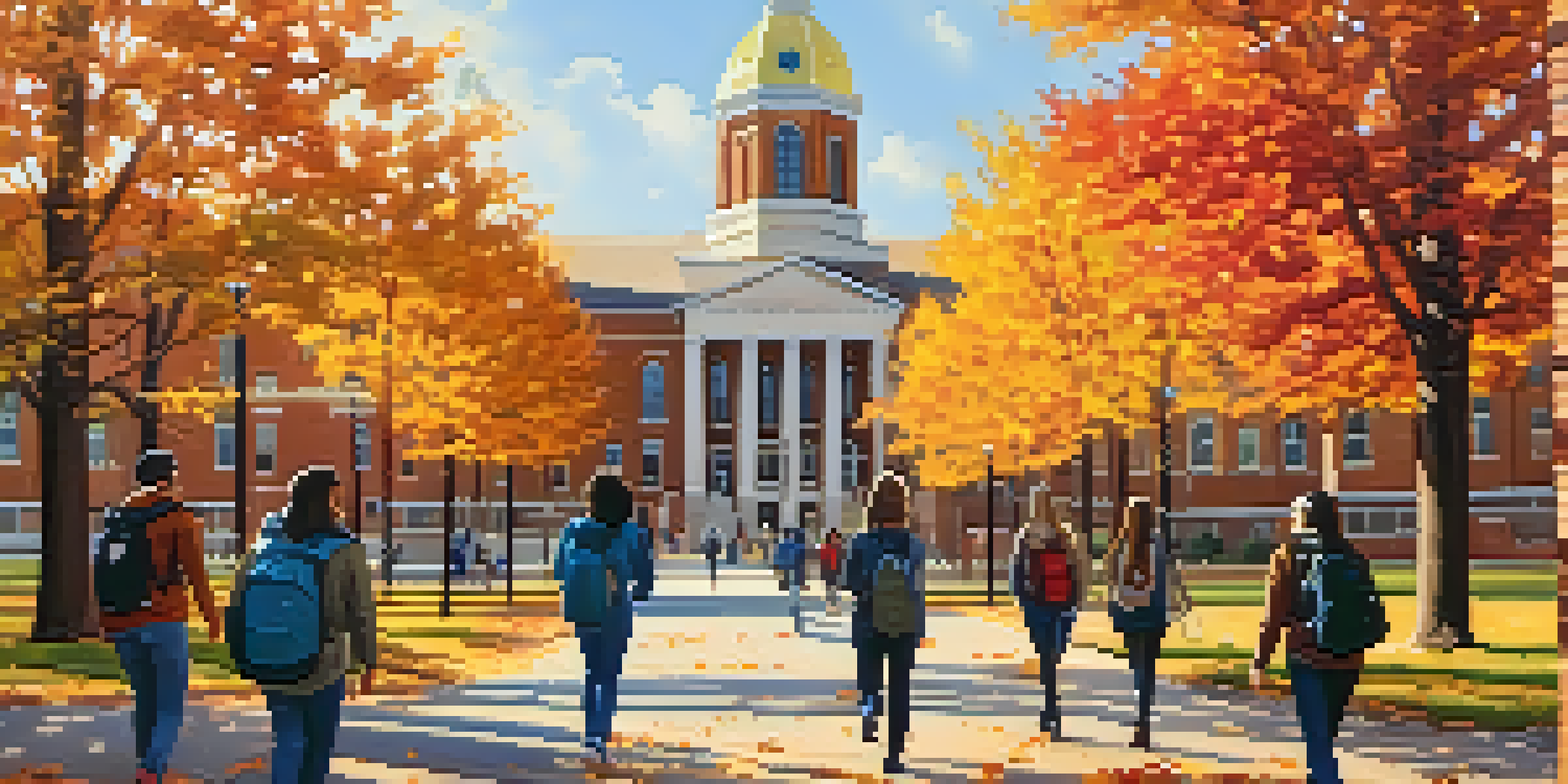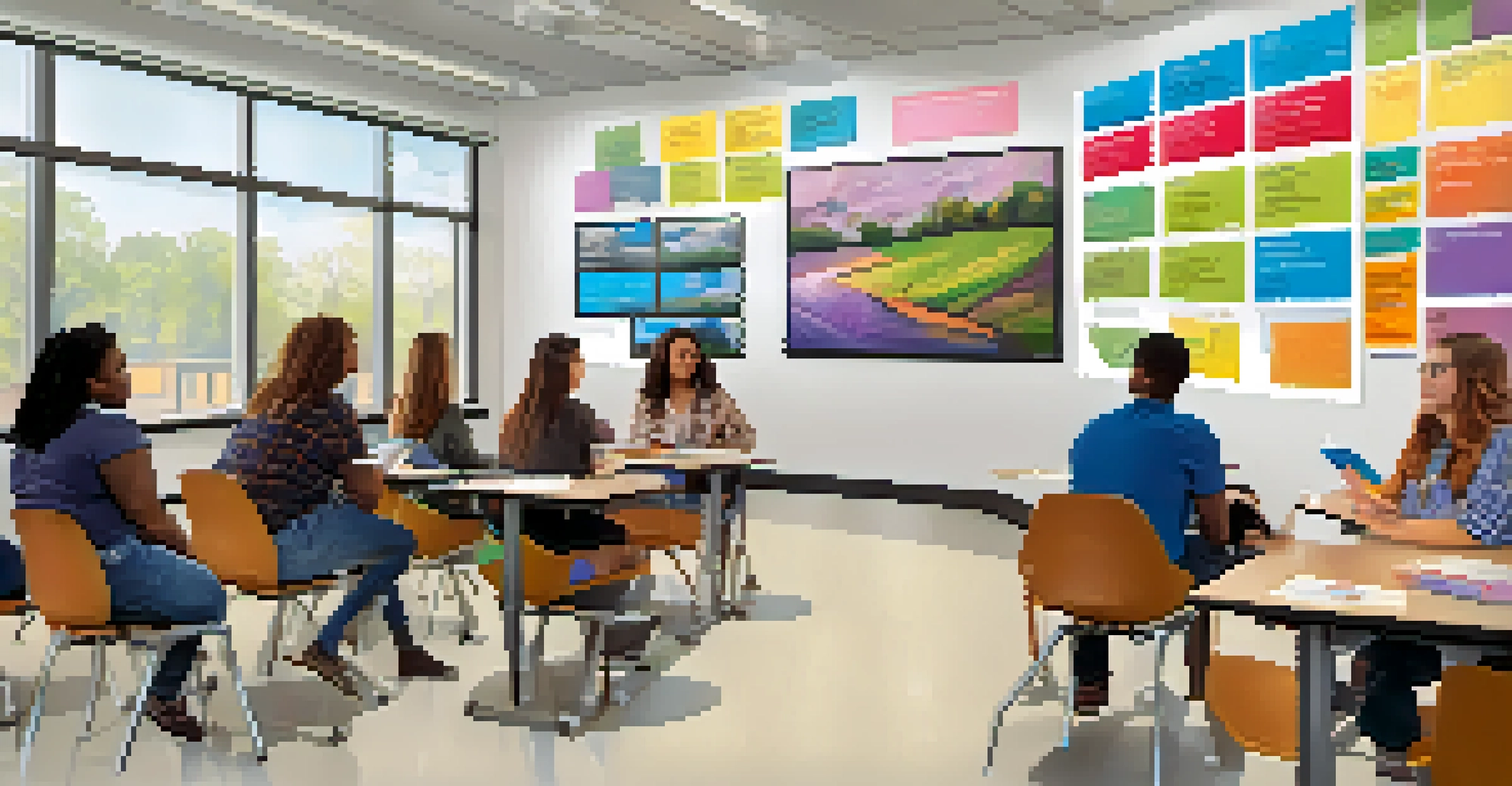Higher Education Institutions in Missouri: A Comprehensive Guide

Understanding Higher Education in Missouri
Missouri is home to a rich tapestry of higher education institutions, ranging from large universities to small liberal arts colleges. Each institution offers unique strengths, catering to diverse student needs and career aspirations. Understanding this landscape is crucial for prospective students as they navigate their educational journeys.
Education is the most powerful weapon which you can use to change the world.
The state's educational offerings are not just about degrees; they also encompass vocational training and community college options, making higher education accessible to a broader audience. This approach helps students from various backgrounds find their path and succeed academically and professionally. Missouri's commitment to education is reflected in its variety of programs designed to support students at every level.
From urban centers like St. Louis and Kansas City to rural areas, Missouri's institutions are strategically located to serve the community. This geographical diversity ensures that students have access to quality education regardless of their location, encouraging a vibrant educational ecosystem throughout the state.
Top Public Universities in Missouri
Missouri boasts several prominent public universities, with the University of Missouri and Missouri State University leading the pack. These institutions offer a wide array of undergraduate and graduate programs, ensuring that students can pursue their interests in various fields. The University of Missouri, for example, is renowned for its research initiatives and vibrant campus life.

Public universities in Missouri often provide competitive tuition rates and extensive financial aid options, making them an attractive choice for many students. Additionally, they have established strong ties with local industries, which can lead to valuable internship and job opportunities post-graduation. This connection to the workforce is a significant advantage for students looking to launch their careers.
Diverse Education Options in Missouri
Missouri offers a variety of higher education institutions, including public universities, private colleges, and community colleges, catering to diverse student needs and career goals.
Moreover, these universities emphasize student engagement and community involvement. Through various clubs, organizations, and service projects, students can develop leadership skills and make meaningful connections, enhancing their overall college experience while also positively impacting their communities.
Notable Private Colleges and Universities
In addition to public institutions, Missouri is home to several esteemed private colleges and universities, such as Washington University in St. Louis and Saint Louis University. These schools tend to offer smaller class sizes and more personalized attention from faculty, which can enhance the learning experience for students. Washington University, in particular, is recognized for its rigorous academic programs and research opportunities.
The future belongs to those who believe in the beauty of their dreams.
Private institutions often provide a distinct educational environment, characterized by strong community values and a focus on holistic development. Students at these colleges typically enjoy close-knit campus atmospheres, fostering relationships that last beyond graduation. The emphasis on collaboration and interdisciplinary studies can also prepare students for the complexities of the modern workforce.
However, it’s important to consider the higher tuition costs often associated with private colleges. Fortunately, many of these institutions offer generous financial aid packages to ensure that talented students can afford a quality education. This commitment to accessibility makes private education a viable option for many families.
Community Colleges: A Pathway to Success
Community colleges in Missouri play a vital role in the higher education landscape by providing accessible and affordable education options for students. Institutions like St. Louis Community College and Ozarks Technical Community College offer a variety of associate degree programs and certifications, making it easier for students to enter the workforce quickly. These colleges are ideal for those looking to save on tuition costs before transferring to a four-year university.
One of the significant advantages of community colleges is their focus on practical skills and vocational training. Programs are often designed in collaboration with local employers, ensuring that students gain relevant experience and knowledge that meet industry demands. This practical approach can lead to immediate job opportunities and economic mobility.
Support for Financial Accessibility
Numerous financial aid options and scholarships are available in Missouri to help students manage the costs of their education and make college more accessible.
Furthermore, community colleges serve as a supportive environment for adult learners and non-traditional students. Many institutions offer flexible scheduling, online courses, and resources tailored to help these students succeed. By breaking down barriers to education, community colleges play a crucial role in fostering lifelong learning in Missouri.
Online Education Opportunities in Missouri
As technology continues to evolve, many higher education institutions in Missouri have embraced online learning as a viable option for students. This shift has made education more accessible, allowing students to balance their studies with work and personal commitments. Online programs can range from fully online degrees to hybrid courses that combine in-person and virtual learning.
Institutions like the University of Missouri and Missouri State University offer robust online programs across various disciplines, catering to the needs of today’s learners. These programs often provide the same quality education and resources as traditional classroom settings, ensuring that online students are well-prepared for their future careers.
However, prospective online students should do their research to find programs that align with their learning styles and career goals. It's essential to consider factors such as accreditation, faculty qualifications, and student support services. With the right program, online education can be a flexible and effective pathway to success.
Financial Aid and Scholarships in Missouri
Navigating the financial aspects of higher education can be daunting, but Missouri offers various financial aid options to help students afford their education. From federal grants and state scholarships to institutional aid, there are numerous resources available to support students financially. Understanding these options early on is crucial for making informed decisions about funding your education.
Many institutions in Missouri have dedicated financial aid offices that guide students through the application process and help them find suitable scholarships. Additionally, state programs like the A+ Schools Program reward students who maintain good academic standing and complete community service hours, further enhancing affordability. Scholarships can significantly reduce the overall cost of education, making college more accessible for everyone.
Growing Online Learning Opportunities
As technology advances, Missouri institutions are increasingly embracing online education, providing flexible learning options that accommodate students' diverse lifestyles.
Moreover, students are encouraged to apply for scholarships early and often, as many opportunities are available through local organizations, foundations, and businesses. By proactively seeking financial assistance, students can alleviate some of the burdens associated with tuition and educational expenses, allowing them to focus on their studies and achieve their academic goals.
Campus Life and Student Services in Missouri
Campus life in Missouri's higher education institutions is vibrant and diverse, offering students a chance to engage in various extracurricular activities and social events. From sports teams and cultural clubs to student government and volunteer opportunities, there’s something for everyone. This dynamic environment not only enriches the college experience but also helps students develop valuable skills outside the classroom.
Most institutions prioritize student services, providing resources such as academic advising, counseling, and career services to support students throughout their educational journey. These services are designed to help students navigate challenges, whether they pertain to academics, mental health, or career planning. Institutions often organize workshops and forums to connect students with professionals and alumni, further enhancing their career readiness.

Additionally, many campuses promote inclusivity and diversity, creating spaces where all students feel welcome and valued. This commitment to fostering a supportive community is essential for student success and personal growth, allowing individuals to thrive academically and socially during their time in college.
The Future of Higher Education in Missouri
As we look to the future, higher education in Missouri is poised to evolve in response to changing workforce demands and technological advancements. Institutions are increasingly focusing on experiential learning, integrating internships and co-op programs into their curricula. This hands-on approach helps students gain practical experience while still in school, making them more competitive in the job market.
Moreover, there is a growing emphasis on interdisciplinary studies, encouraging students to explore multiple fields and develop diverse skill sets. This trend aligns with the needs of modern employers who seek adaptable and innovative thinkers. By offering programs that blend various disciplines, Missouri institutions are preparing students for the complexities of the global economy.
In addition, the rise of online and hybrid learning models is likely to continue, providing students with greater flexibility in how they pursue their education. As technology advances, institutions will need to adapt their teaching methods to ensure that students receive a quality education that meets their needs. The future of higher education in Missouri looks bright as institutions strive to innovate and enhance the student experience.